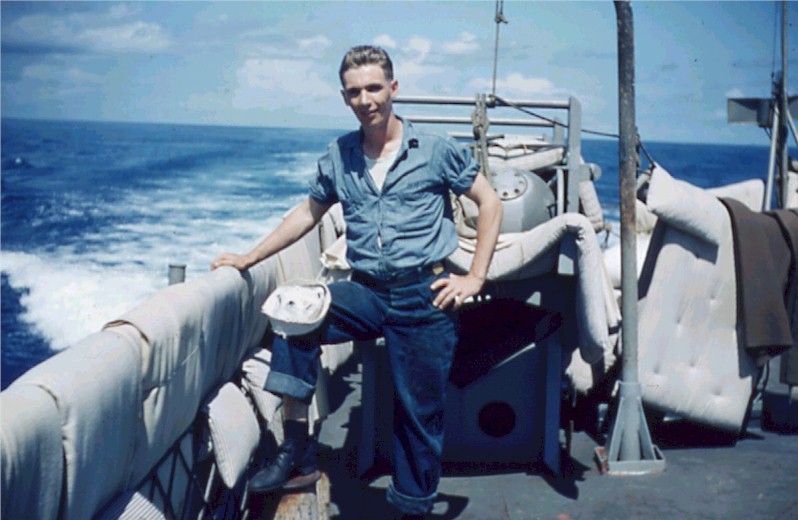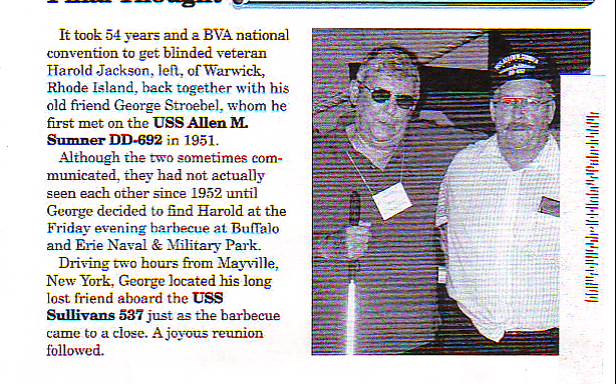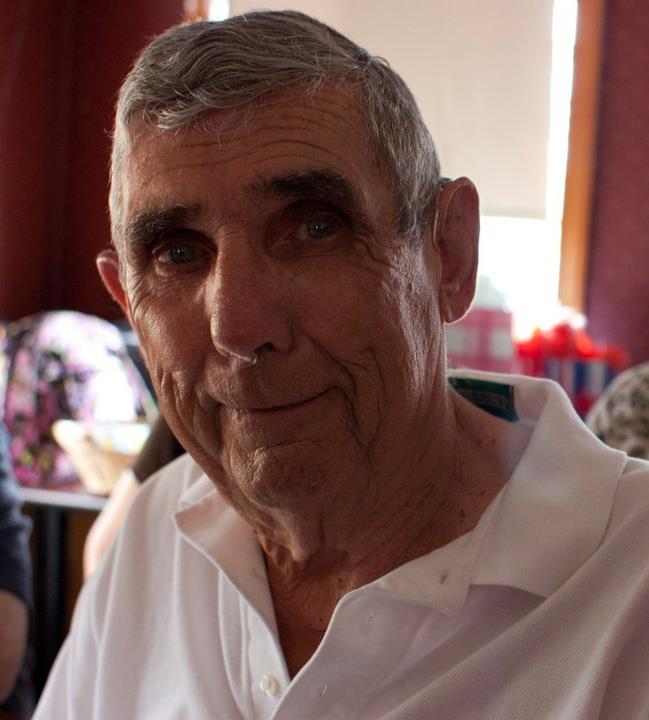My grandfather was legally blind.
Even in my earliest memories of him, he did not drive, My grandmother drove until she needed to give up driving herself. He never really described his vision to me in detail, but I do remember him saying it was darker, he saw mostly shapes and outlines, and he always asked you to move in closer when having a conversation so he could see you. He carried his folding white cane everywhere with him (if you see someone with a white cane, offer assistance), and we always looked after him to make sure he had everything he needed to be independent and live on his own.
He suffered from Macular Degeneration, an incurable eye disease that causes degradation of vision, straight lines to appear wavy, and dark or blurry areas in the center of your vision.
Macular degeneration is the leading cause of vision loss, affecting more than 10 million Americans – more than cataracts and glaucoma combined.
(source: American Macular Degeneration Foundation)
He was a very proud veteran, serving for the US Navy during the Korean War aboard the USS Allen M. Sumner (DD-692). He fondly told stories of his time at sea circumnavigating the globe, having stopped in Spain, Greece, Japan, and more (if this interests you, you can read the ship’s entire 1953 log book, or view information about the ship’s Korean War deployment). He was honorably discharged on May 19th, 1955 as a MM2 (Machinist Mate Second Class) and returned home.

Many years later when his vision had declined, his veteran status made him eligible for computer training in Connecticut. While there, he and other blind veterans were taught how to use the computer to perform general tasks, everything from composing documents and printing to sending e-mails and using the Internet. After his training, he returned home and a technician came to his house to set up a computer for him to use.
We emailed back and forth regularly, which was great! I still have some of them in an old email account of mine, asking for scuttlebutt for the “ol’ sea dog”. When I visited him, he was always excited to show me the new projects he was working on, the new useful site he had discovered, or the new tricks he had learned. Since I was good with computers (and his grandson), he also turned to me for help.
Because he was blind, he relied on a combination of screen reading software (JAWS) and zoom software to magnify his screen to a size that he could read. Using a screen reader takes a lot of patience. At first, helping him was difficult for me. I had to slow down considerably in order to allow him time to listen and step through the commands and navigate the screen with JAWS. Eventually, I adjusted, and I frequently helped him with common issues he experienced.
What’s The Point?
While I enjoy reminiscing about the times I shared with my grandfather, I am telling you about him for a reason. My experiences with my grandfather made me aware of accessibility and its importance, specifically related to blindness. Some people are never exposed to anyone with a disability, so I consider myself to have an above average awareness of accessibility.
When I think of accessibility, I think of my grandfather. I watched the Internet open so many doors for him. He had a new hobby to pass the time. He scanned old photograph slides and photos and shared them with family and friends who had no idea they existed. He reconnected with old shipmates and contributed his photos and stories to the officially commissioned website for his destroyer. He helped produce and edit email newsletters for online blind communities.
While at a Blind Veterans of America (BVA) reunion in 2006, a former ship mate (who was not blind) decided to drive the 2 hours to the reunion to surprise him. He knew my grandfather would be there after reconnecting through email. The two had not seen each other in over 54 years.

I want WordPress to open the same doors for everyone, regardless of their mental or physical abilities.
When I worked at Boston University, I frequently asked team members to revise designs or update markup to be more accessible. I played around with pa11y and proposed adding an automated accessibility scan to our pull request process. When I have questions about accessibility best practices, I reach out to accessibility contributors for answers.
But, up until now, my involvement with accessibility has only met the bare minimum. And I want to do better.
Fixing The Problem
This post is not to discuss why certain decisions have been made, the politics of those decisions, or the different opinions of whether Gutenberg is the right thing for WordPress (for the record, I believe it is). What’s done is done, and I’m not aware of any time machines in existence.
This is a personal exercise for me to take my share of the responsibility for the current state of accessibility, and define the steps I am going to take to improve it.
The problem: I have not done enough to positively progress accessibility in WordPress.
Accessibility is not just about physical disabilities, whether permanent such as blindness or temporary due to a broken arm. Accessibility can also help those with cognitive disabilities, such as Dylexia. It even benefits those without disabilities dealing with situational limitations, such as being in bright sunlight, or living in an area with expensive or low bandwidth.
The passionate WordPress accessibility community needs support. Many are burnt out, beyond frustrated. They have been asking, hell, pleading with us to do more to progress accessibility. More people need to join in and help. It’s time for more people to listen.
My Pledge
Below is what I am pledging to do moving forward:
- I pledge to learn something new about accessibility every week.
- I pledge to blog about what I learn to help spread awareness and share knowledge.
- I pledge to provide closed captions for any publicly available video of me speaking.
- I pledge to spend two days a month working exclusively on accessibility tickets for WordPress (I will still work on accessibility tickets outside of these two days, but these days will exclusively be accessibility).
- I pledge to more closely follow the #accessibility meetings in the WordPress.org Slack and offer help whenever I can.
In the grand scheme of things, this is not a lot at all. But, if everyone makes a similar pledge to do something to progress accessibility, it will quickly add up.
I challenge everyone to step back and think about what they have done recently to progress accessibility in WordPress, and consider why they have not done more.
Please, hold me accountable to my pledge above. Ask me which days I focused on accessibility tickets this month. Ask me what I have learned this week about accessibility. Ask me for a ticket you can help out on.
Write a blog post with your own reflection and pledge. Comment below with your pledge. Put it somewhere publicly and ask your peers to hold you accountable.

Note:
I am extremely fortunate to be part of a team at Bluehost that is sponsored to contribute to the WordPress open source project. Part of my job (as I see it) is community service.
I am always available to anyone who needs help with any aspect of contributing to WordPress. Anything from help with running VVV to writing a component meeting summary. You are always welcome to ping me and ask for help on Slack.
4 responses to “Accessibility: A Developer’s Pledge”
[…] A great deal of friction has surrounded Gutenberg’s journey towards becoming an accessible tool for millions of users. The struggle has highlighted areas where the WordPress project can improve its collaboration across teams. It has inspired many to share their personal stories and some have even pledged to ramp up their accessibility contributions. […]
[…] A great deal of friction has surrounded Gutenberg’s journey towards becoming an accessible tool for millions of users. The struggle has highlighted areas where the WordPress project can improve its collaboration across teams. It has inspired many to share their personal stories and some have even pledged to ramp up their accessibility contributions. […]
[…] A great deal of friction has surrounded Gutenberg’s journey towards becoming an accessible tool for millions of users. The struggle has highlighted areas where the WordPress project can improve its collaboration across teams. It has inspired many to share their personal stories and some have even pledged to ramp up their accessibility contributions. […]
[…] Accessibility: A Developer’s Pledge […]